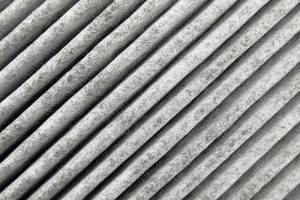If there’s one thing about air conditioning that we wish every homeowner knew, it’s that they need to regularly change the AC’s air filter. Of course, we’d love for our customers to know even more about how to properly care for their cooling systems, but keeping up with this single task can eliminate many troubles that can torture your AC and leave you with higher bills and lower comfort.
When we perform regular AC maintenance in Forsyth, GA, we always change the air filter. However, air conditioners need to have their filters changed more often than once a year, so the responsibility falls on you to take care of this job during the rest of the cooling season. It’s not difficult, but the difference it makes is substantial.
What’s the air filter for anyway?
You might think that the air filter on the indoor air conditioner cabinet is a way to help clean the air inside your home. Although the filter does have a mild impact on indoor air quality, that’s not its main job. (If you want cleaner indoor air, you’ll need to have special whole-house filters installed into the HVAC system. We offer this service.)
The purpose of this air filter is to protect the interior of the AC cabinet from the infiltration of dust and other debris that enters through the return air ducts. The filter is positioned between the air duct and the blower assembly so it traps unwanted debris before it enters the cabinet, where it will contaminate moving parts such as motors and interfere with heat exchange along the evaporator coil.
Regularly changing the air filter
An air filter isn’t self-cleaning: it will accumulate a thick collection of lint, dust, hair, and more over time until it begins to choke off airflow through the AC. When the filter becomes too dirty, it needs to be swapped out for a clean one.
The frequency of filter changes depends on several factors, such as how often you run the AC and the strength of the filter. Simple panel filters will last for around one month, while thicker pleated filters with more surface area can often last for three months. We recommend starting with monthly checks on the filter to see how dirty it is. You’ll soon learn a good schedule for filter changes.
What might happen if you leave a dirty filter in place
As we mentioned above, a dirty air filter will restrict airflow into the AC. It also places more pressure on the blower fan to draw air through the return air ducts. This can have several negative effects:
- Reduced airflow: With lower airflow through the air conditioner, a lower volume of air gets cooled and sent to the rooms, leading to reduced cooling.
- Higher energy bills: When the blower fans work harder, it drives up your electricity bill. The AC will also need to run for longer because it won’t produce enough cooling.
- Overheating: The strain placed on the blower motor can cause it to overheat and trip its circuit breaker, shutting off the AC.
- Dust infiltration: A clogged air filter won’t be able to do its job effectively. Dust and other debris will start to slip in around the sides of the filter as it bends from increased air pressure.


